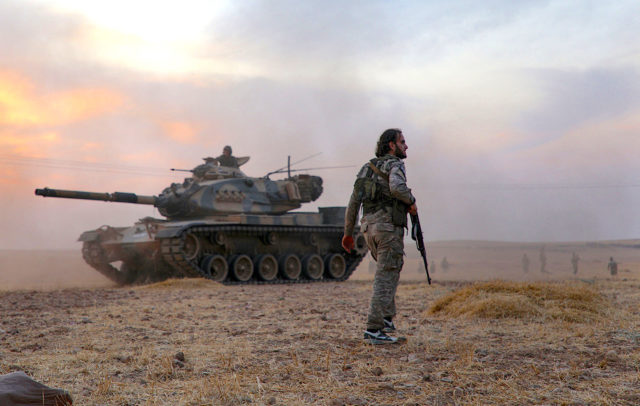
Kurdish forces, facing a well-armed and aggressive Turkey, appear to have turned to the Syrian government — meaning its sponsors in Iran and Russia — for rescue. It makes sense in historical terms, although it is likely to be bloody in current ones. Historical, in this case, means before the U.S. military presence in the northern part of the country.
The Syrian government is a minority Alawite (heterodox Shiite) one that had maintained control by allying with other minority groups in the country — such as Kurds and Christians — and with the Shiite rulers of Iran in order to keep a boot on the neck of the majority Sunni population. The war criminal Bashar al-Assad was simply following in his war criminal father’s footsteps — in 1982, Hafez al-Assad massacred tens of thousands of Sunnis in the town of Hama, ensuring general quiet until 2011. Young Bashar, being a less efficient criminal, has killed more than half a million people (the U.N. stopped counting in 2016) and creating what the U.N. estimated in 2018 to be more than 13 million displaced people — more than six million internally plus more than three million in Turkey and one million more in Lebanon.
Most of them are Sunni. Deliberately.
Turkey’s president, Recep Tayyip Erdogan, declared two goals in the current operation: To remove what he considers a threat from a terrorist organization, the PKK (set this aside for a moment), and to open the way to resettle more than one million Syrian refugees back in Syria. The refugees have become a political and economic liability for Turkey’s government.
Shiite Iran, one of Syria’s sponsors, was furious, warning Turkey not to enter Syrian territory. Foreign Minister Javad Zarif was explicit, denouncing military action and “urging respect for Syria’s territorial integrity and national sovereignty.” His statement stressed “the need for the fight against terrorism and for the establishment of stability and security in Syria.”
Iran is less concerned about Kurds — PKK or otherwise — than with the disposition of the mostly-Sunni refugees. Iran’s entry into Syria in command of tens of thousands of Shiite troops — not primarily Iranians, but Pakistanis, Afghans, and others commanded by the Iran’s Islamic Revolutionary Guard Corps — was a wedge designed to ethnically cleanse the Sunni center of the country. Alawites generally live along the Mediterranean coast and Kurds in the north and northeast. Decimating the center would allow Iran to move overland from Iran through Iraq and then into Syria and Lebanon, firming up the long-sought Shiite Crescent — Israel’s nightmare. American troops remain in southern Syria and in Jordan to prevent consolidation of such a route.
Russia, Syria’s other sponsor, is mainly concerned with maintenance of its bases, air and naval, on the coast. Deeply committed to the Assad regime — and complicit in its crimes — Russia will be satisfied with whatever brings more of Syria under the control of Damascus. Russia’s position since 2011 is that Syria is a country in civil war and only forces invited by the government should be permitted there.
For now, two of America’s adversaries — Iran and Russia — are willing to push Turkey back on behalf of the Kurds, not to befriend the Kurds but to discomfit Turkey. This is the long-term nature of the conflict. Russia and Turkey are historic adversaries; Turkey and Iran are historic adversaries. Russia has coveted warm water ports, including Mediterranean bases; Iran has coveted the Crescent. Four hundred years of Ottoman Turkish occupation of the region that at one point included the entire Levant, the Balkans to Hungary, North Africa, the Crimean Khanate, and a border with Iran in the Caucasus down to Basra, should suggest that Turkey has been a thorn in the backside of a lot of people for a long time. The Armenian genocide and the massive transfer of the Greek population in the early part of the 20th century were last gasps of the Ottoman Empire.
But in the 21st century, apparently, Erdogan has delusions. The Russians and Iranians have dealt with them before — the West hasn’t since the Siege of Vienna. The United States never has.
The Kurds are friends of the United States, and the U.S. has worked with them in Iraq and in Syria — more successfully in the former than in the latter. Their present situation is much to be lamented, but it is clear that the United States is unwilling — and ill-prepared — to destroy the government of modern Syria and redistribute the territory. That being so, it will not find an appropriate spot in the fight among three revanchist, expansionist regional powers.





